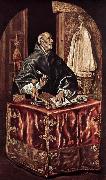Wholesale Oil Painting Reproductions No Minimum and Door to Door! |
|||||||||||
|
|
|||||||||||

|
|||||||||||
|
|
|
||||||||
All GRECO, El Oil Paintings |
||||||||
|
|
||||||||
|
|
||||||||
|
Artist Introduction: Greek-born Spanish Mannerist Painter, 1541-1614
Greek painter, designer and engraver, active in Italy and Spain. One of the most original and interesting painters of 16th-century Europe, he transformed the Byzantine style of his early paintings into another, wholly Western manner. He was active in his native Crete, in Venice and Rome, and, during the second half of his life, in Toledo. He was renowned in his lifetime for his originality and extravagance and provides one of the most curious examples of the oscillations of taste in the evaluation of a painter,
|
||||||||
|
|
||||||||
|
St Ildefonso Painting ID:: 43710 |
1610-13
Oil on canvas,
219 x 105 cm |
|||||||
Height Width |
INS/CM Quality |
|||||||
|
X |
| |||||||
|
|
||||||||
All GRECO, El Oil Paintings |
||||||||
|
|
||||||||
|
|
||||||||
|
Artist Introduction: Greek-born Spanish Mannerist Painter, 1541-1614
Greek painter, designer and engraver, active in Italy and Spain. One of the most original and interesting painters of 16th-century Europe, he transformed the Byzantine style of his early paintings into another, wholly Western manner. He was active in his native Crete, in Venice and Rome, and, during the second half of his life, in Toledo. He was renowned in his lifetime for his originality and extravagance and provides one of the most curious examples of the oscillations of taste in the evaluation of a painter,
|
||||||||
|
|
||||||||
|
|
St Ildefonso Painting ID:: 62340 |
112 x 65 cm National Gallery of Art, Washington This is a smaller replica of the picture in the Hospital de la Caridad in Illescas. It belonged once to the painter Jean Francois Millet, and later to Edgar Degas. The original painting is in the side altar on the left of the main chapel of the church, balancing the Virgin of Charity. Its original place in the church is not known. The painting is not mentioned in the incomplete documentation for the decoration of the chapel, and if, as is probable, it was not painted at the same time, it cannot date much before June 1603, the date of the contract, and was more likely painted soon after the conclusion of litigation in August 1607. In its present position, it makes a grand pair to the Virgin of Charity, and is one of the most splendid of his 'portraits' of Saints. It is difficult, and perhaps not proper, to separate his portraits of Saints from his actual portraits. In both he employs all his means of spiritual or psychological expression. The legend is that Saint Ildefonso, the first Bishop of Toledo, presented an image of the Virgin of the Mantle to a foundation of his in Illescas. The Saint is portrayed before the same image, as he wrote his dissertation on the Purity of the Virgin. The state of inspiration is brilliantly expressed. There is an infinite distinction in expression between the hand poised with the pen in this 'portrait' and the similar motif in the portrait of his son. Author: GRECO, El Title: St Ildefonso , 1551-1600 , Spanish Form: painting , religious |
||||||
Height Width |
INS/CM Quality |
|||||||
|
X |
| |||||||
|
|
||||||||
|
Prev Next
|
||||||||
|
|
||||||||
|
Related Paintings to GRECO, El :. |
||||||||
|
|
||||||||
|
CONTACT US |


